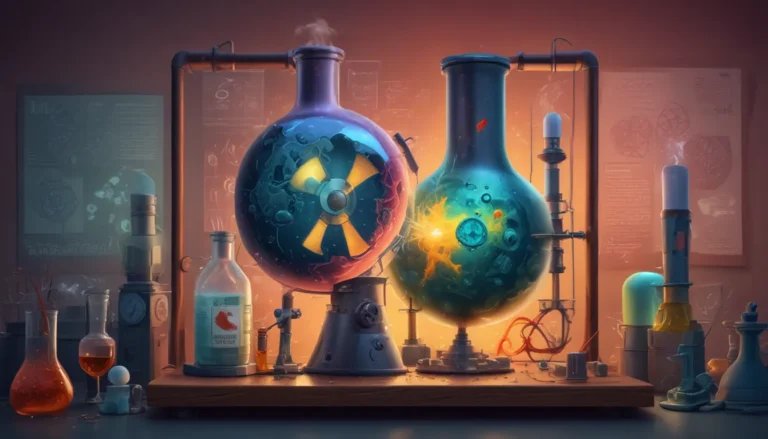A Note About Images: The images used in our articles are for illustration purposes only and may not exactly match the content. They are meant to engage readers, but the text should be relied upon for accurate information.
In the vast realm of chemistry, the term “nucleophile” holds significant importance. These electron donors are essential for creating medicines, organic compounds, and even environmental cleanup. Scientists and researchers are constantly intrigued by the properties and roles of nucleophiles in various chemical reactions. But what exactly are nucleophiles, and why are they so fascinating? Let’s delve into the captivating world of nucleophiles and uncover 19 intriguing facts about them.
Understanding Nucleophiles: The Electron Donors
Nucleophiles are chemical species that donate electron pairs to form new chemical bonds with other atoms or molecules. They have an affinity towards positively charged atoms or regions with vacant or low electron density. This unique ability allows nucleophiles to play a crucial role in organic reactions, initiating the breaking and formation of bonds, ultimately leading to the synthesis of new organic compounds.
The Role of Nucleophiles in Organic Chemistry
Nucleophiles are key players in organic reactions, particularly in nucleophilic substitution and addition reactions. By launching a nucleophilic attack on an electrophile, a nucleophile forms a new bond, which can occur at various sites such as carbon, nitrogen, or oxygen. Understanding nucleophiles helps scientists design better drugs, create eco-friendly chemical reactions, and contribute to a more sustainable approach to chemistry.
- Nucleophilicity Trends:
- Nucleophilicity varies based on the nature of the nucleophile and reaction conditions.
-
Higher electron density and the presence of a lone pair of electrons increase nucleophilicity.
-
Solvation Effects:
- The ability of a nucleophile to dissolve in a particular solvent affects its reactivity.
-
Solvation plays a significant role in determining nucleophilic strength.
-
Nucleophile vs. Base:
- Nucleophiles form new chemical bonds, whereas bases typically remove or accept protons.
-
Nucleophiles play a key role in biological processes and environmental cleanup.
-
Types of Nucleophiles:
- Nucleophiles can be neutral molecules, anions, or even cationic species.
- Common examples include hydroxide ion (OH-), cyanide ion (CN-), and ammonia (NH3).
Nucleophilic Reactions: Substitution, Addition, and Aromatic Substitution
- Nucleophilic Substitution:
- In this fundamental organic reaction, a nucleophile replaces a leaving group in a molecule.
-
Nucleophilic substitution is widely used in pharmaceutical synthesis.
-
Nucleophilic Addition:
- In nucleophilic addition reactions, a nucleophile adds to a carbon-carbon double bond or a carbon-oxygen double bond.
-
This process is commonly observed in alcohol synthesis.
-
Nucleophilic Aromatic Substitution:
- This reaction allows the introduction of a nucleophile onto an aromatic ring.
- Nucleophilic aromatic substitution is crucial in organic compound modification.
Mechanistic Insights: SN1 vs. SN2 Reactions and Nucleophile Strength Order
- SN1 vs. SN2 Reactions:
- Nucleophilic substitution can occur through two mechanisms: SN1 (unimolecular) and SN2 (bimolecular).
-
The choice of mechanism depends on factors like nucleophile strength and substrate structure.
-
Nucleophile Strength Order:
- Negatively charged species are the strongest nucleophiles, followed by neutral molecules with lone pairs.
- Weakly nucleophilic cationic species are at the lower end of the nucleophilicity scale.
Impact of Leaving Groups and Nucleophilicity in Biological Systems
- Influence of Leaving Group:
- The nature of the leaving group attached to the substrate affects nucleophilic substitution reactions.
-
A good leaving group enhances the reaction rate by stabilizing the transition state.
-
Nucleophile in Biological Systems:
- Nucleophiles are crucial for enzymatic reactions, DNA replication, and protein synthesis.
- They play a critical role in maintaining the balance of biochemical processes.
Practical Applications: Nucleophilicity in Drug Design, Organic Synthesis, and Environmental Chemistry
- The Role of Nucleophilicity in Drug Design:
- Nucleophilicity is pivotal in designing and developing pharmaceutical compounds.
-
Understanding nucleophile reactivity aids in creating more effective and targeted drugs.
-
Nucleophiles in Organic Synthesis:
- Nucleophiles are vital in organic synthesis for creating molecules with desired properties.
-
Their selective reactivity with functional groups enables the construction of complex organic frameworks.
-
Nucleophiles in Environmental Chemistry:
- In environmental chemistry, nucleophiles help in pollutant degradation and environmental cleanup.
-
They assist in breaking down harmful substances, reducing their impact on ecosystems.
-
Nucleophiles and Green Chemistry:
- Nucleophiles play a key role in green chemistry initiatives by reducing waste generation.
- Employing environmentally friendly solvents promotes a sustainable approach to chemical synthesis.
Embracing the Marvels of Nucleophiles: A Gateway to Chemistry’s Mysteries
In conclusion, nucleophiles are captivating chemical species that drive various chemical reactions. Their electron-rich nature allows them to engage in nucleophilic attacks, forming new chemical bonds and participating in essential synthesis processes. By comprehending the properties and behaviors of nucleophiles, scientists and researchers can design efficient processes that contribute to advancements in medicine, materials science, and environmental studies.
Whether you’re a student, a professional chemist, or simply curious about the molecular world, exploring the realm of nucleophiles can expand your knowledge and appreciation for chemistry. These intriguing facts about nucleophiles shed light on their significance in diverse fields, offering a glimpse into the fundamental concepts of organic and inorganic chemistry. Let’s continue to unravel the wonders of chemistry through the fascinating world of nucleophiles!
FAQs About Nucleophiles
- What is a nucleophile?
- A nucleophile is a chemical species that donates a pair of electrons to form a new chemical bond.
- What are some examples of nucleophiles?
- Common nucleophiles include hydroxide ions (OH-), ammonia (NH3), alcohols, thiolates, and amines.
- How do nucleophiles participate in chemical reactions?
- Nucleophiles attack electron-deficient centers, donating their electrons to form new bonds.
- Can nucleophiles be used in catalytic reactions?
- Yes, nucleophiles can participate in catalytic reactions, facilitating chemical transformations.
- How do nucleophiles contribute to biological systems?
- Nucleophiles play essential roles in enzymatic reactions, DNA replication, and protein synthesis.
Explore the intriguing world of nucleophiles and uncover the mysteries that shape the world of chemistry. Let’s continue to learn, discover, and appreciate the boundless wonders that nucleophiles bring to the fascinating realm of molecular science.






